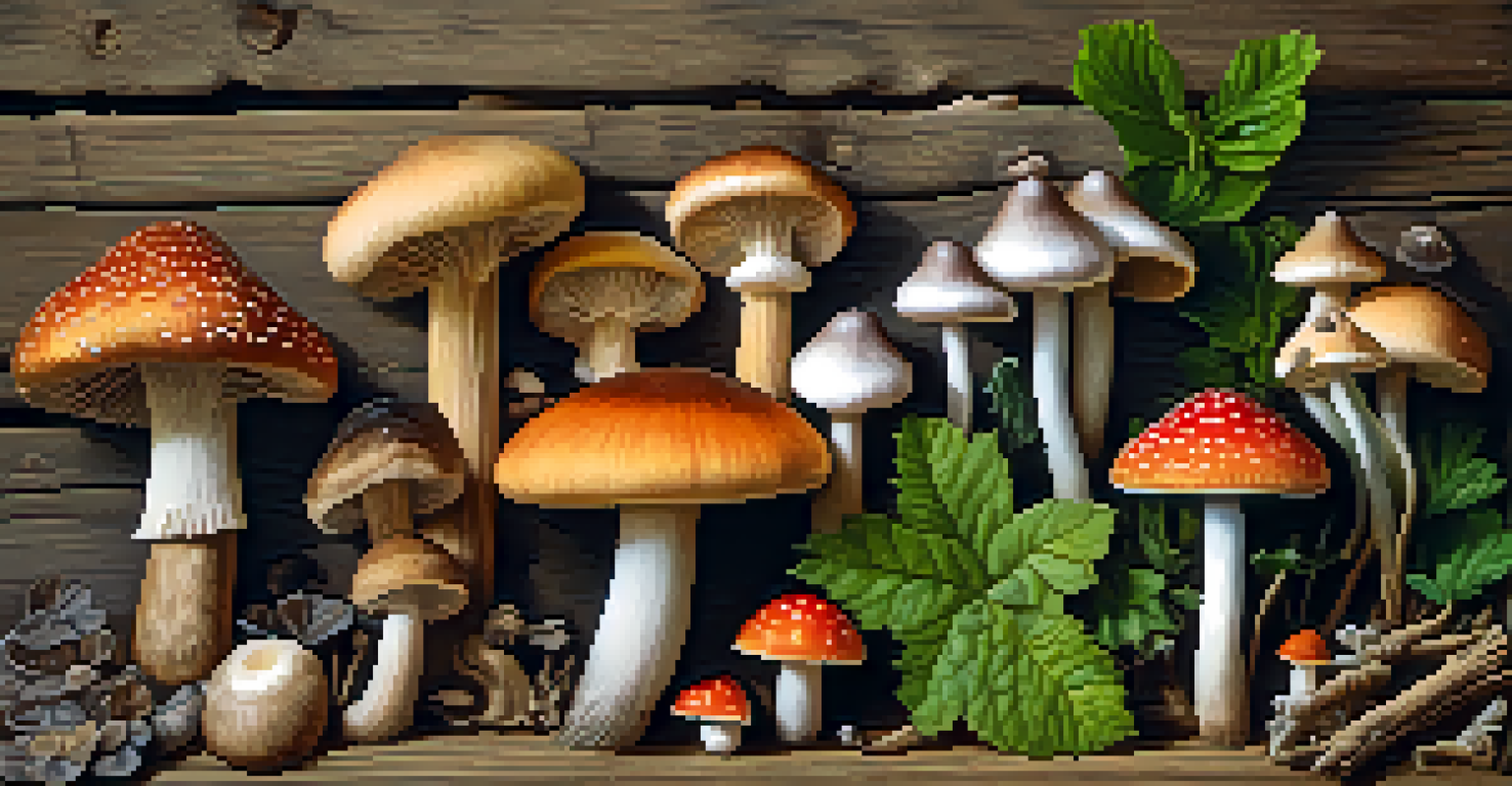Cultural Perspectives on Entheogens and Personal Change

Understanding Entheogens: A Cultural Context
Entheogens are substances that, when ingested, can lead to altered states of consciousness. Many cultures have utilized these substances, often in religious or spiritual contexts, to facilitate personal and communal growth. For instance, indigenous tribes in the Amazon have used ayahuasca for centuries as a means of connecting with the spiritual world and fostering healing.
The experience of the sacred is not a singular reality but rather a multitude of perspectives, each shaped by culture and context.
In contrast, Western societies have historically approached entheogens with skepticism, often associating them with counterculture movements. This dichotomy highlights the varying perceptions of these substances across cultures, where one sees them as sacred tools for exploration while the other views them as dangerous or taboo.
Understanding these cultural perspectives is crucial for appreciating the broader conversation around personal change through entheogens. It sheds light on how experiences can differ vastly based on societal norms and values.
Historical Uses of Entheogens in Different Cultures
Throughout history, various civilizations have incorporated entheogens into their rituals and practices. For example, the ancient Greeks used kykeon, a drink that may have contained psychoactive substances, during the Eleusinian Mysteries to facilitate spiritual insights. Similarly, the Aztecs revered peyote, integrating it into their ceremonies for divination and healing.

These historical examples illustrate that entheogens have long been regarded as catalysts for personal transformation and communal bonding. They provide individuals with opportunities to confront inner truths and foster a deeper connection with the universe around them.
Cultural Perspectives on Entheogens
Different cultures view entheogens as sacred tools for exploration or as taboo substances, shaping their use and acceptance.
By examining these historical contexts, we can gain insight into how and why these substances were respected and understood, which can inform modern practices and perceptions of entheogens today.
Modern Resurgence: Entheogens in Contemporary Society
In recent years, there has been a notable resurgence in the interest surrounding entheogens, particularly in Western contexts. This shift is driven by a growing body of research highlighting their potential therapeutic benefits for mental health conditions like depression and PTSD. The new wave of scientific inquiry is challenging long-held stigmas and opening doors for broader acceptance.
Entheogens are a key to understanding our place in the universe, providing a bridge between the known and the unknown.
Additionally, many people are exploring these substances for personal insights and spiritual growth. As wellness culture gains momentum, entheogens are increasingly framed as tools for self-discovery and healing, drawing parallels to ancient practices that once revered their power.
This modern resurgence not only highlights a renewed curiosity but also raises questions about ethical implications and the need for responsible use. Navigating these discussions is essential as society grapples with balancing tradition, science, and personal experience.
Cultural Appropriation vs. Appreciation in Entheogen Use
As entheogens gain popularity, a critical conversation about cultural appropriation emerges. Many of the practices surrounding these substances are rooted in specific cultural traditions, and their commodification can lead to the dilution or misrepresentation of their significance. For example, when individuals from outside these cultures engage with ayahuasca retreats without understanding their origins, it raises ethical concerns.
On the flip side, there is a growing appreciation for the wisdom these cultures offer. Many are advocating for respectful engagement, emphasizing the importance of learning from indigenous practices while honoring their origins. This involves understanding the cultural narratives and rituals surrounding entheogens rather than merely adopting them.
Modern Therapeutic Applications
Recent research is uncovering the therapeutic potential of entheogens for mental health, challenging old stigmas and promoting acceptance.
Navigating this balance between appropriation and appreciation is essential as we explore the potential of entheogens for personal change. It calls for a mindful approach that respects and acknowledges the rich tapestry of cultural histories.
Personal Narratives: Transformative Experiences with Entheogens
Personal stories often serve as powerful testimonials to the transformative potential of entheogens. Many individuals report profound experiences that lead to shifts in perspective, emotional healing, and even life direction. For example, someone might share how a psilocybin journey helped them confront deep-seated fears, resulting in a newfound clarity and purpose.
These narratives not only illustrate the personal impact of entheogens but also highlight the shared human experience of seeking meaning and connection. As these stories circulate, they foster a sense of community and belonging among those who have embarked on similar journeys.
Moreover, personal accounts can bridge the gap between skepticism and acceptance, providing relatable insights that resonate with others. They invite curiosity and encourage open dialogue about the potential benefits of entheogens in personal transformation.
Research and Evidence: The Science Behind Entheogens
Scientific research has played a pivotal role in reshaping perceptions of entheogens. Studies have demonstrated the efficacy of substances like psilocybin and MDMA in therapeutic settings, showing promising results in treating conditions like anxiety and depression. This growing body of evidence supports the idea that these substances can facilitate meaningful personal change.
Moreover, research often underscores the importance of set and setting, emphasizing that the context in which entheogens are consumed significantly influences the experience. This reinforces the need for safe, guided environments where individuals can explore their consciousness responsibly.
Navigating Cultural Sensitivity
As interest in entheogens grows, it's essential to balance appreciation and respect for indigenous practices while avoiding cultural appropriation.
As the scientific community continues to explore the benefits and risks associated with entheogens, it paves the way for informed discussions about their role in mental health and personal growth.
The Future of Entheogens in Personal Development
Looking ahead, the future of entheogens in personal development appears promising, yet complex. As more individuals seek alternative approaches to well-being, the integration of these substances into therapeutic practices may become more mainstream. This evolution could lead to greater awareness and acceptance, provided it is approached thoughtfully and ethically.
However, it also poses challenges, such as ensuring that the knowledge and practices of indigenous cultures are respected and preserved. Establishing frameworks that honor these traditions while promoting safe use will be crucial as interest in entheogens grows.

Ultimately, the conversation about entheogens and personal change is just beginning. By fostering a respectful dialogue, we can explore their potential while remaining mindful of the rich cultural histories that inform their use.